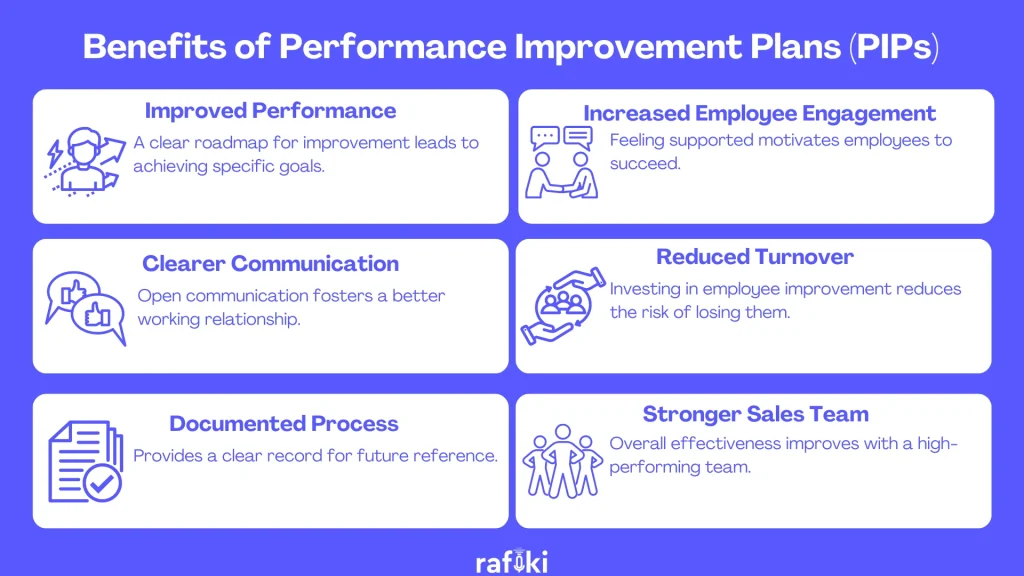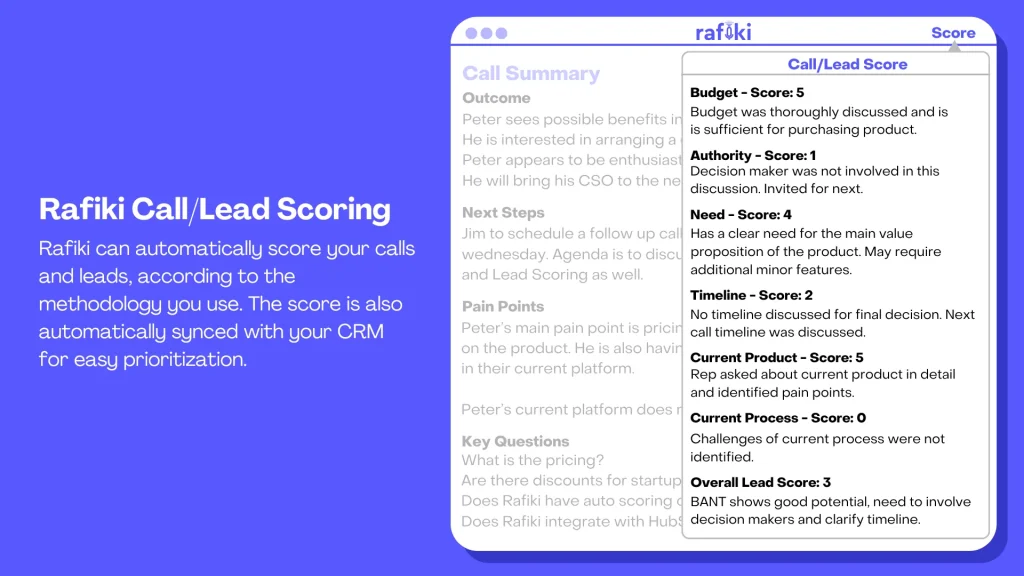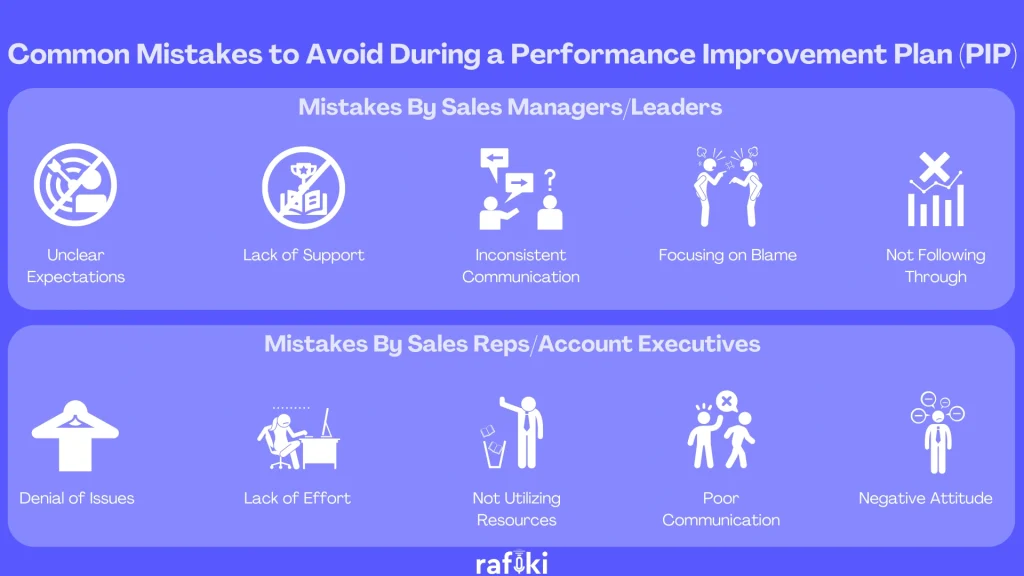Why Rafiki
Pricing


Pricing
Solutions

RevOps Leaders
Synchronize revenue generating functions

SDR Leaders
Get your team aligned and Coach your Reps 3x faster at scale

Sales Leaders
Unlock pipeline truth, drive confident forecasts


Even the most stellar sales reps can hit a rough patch. Sometimes, a performance improvement plan (PIP) is necessary to address performance issues and get things back on track. But a PIP doesn't have to be a scary document. When implemented correctly, it can be a valuable tool for both the sales leader and the employee.
This guide will walk you through everything you need to know about crafting an effective sales performance improvement plan, including common pitfalls to avoid and actionable tips for success.
A Performance Improvement Plan (PIP) is a formal document that addresses an employee's performance shortcomings. It outlines specific areas where their work isn't meeting expectations. The PIP should be clear and actionable, detailing specific goals the employee needs to achieve. These goals should be SMART (Specific, Measurable, Achievable, Relevant, and Time-bound) to ensure everyone is on the same page. The PIP also establishes a timeline for achieving these goals and outlines the potential consequences if they aren't met. While a PIP can feel like a negative step, it's actually a structured approach to helping employees course-correct and reach their full potential.
The effectiveness of a PIP depends on several factors. First, it needs to be based on documented evidence of performance issues, not just subjective feelings. Using Rafiki’s Smart Call Scoring, you can have your employees’ performances objectively scored backed with data. This removes any fear from the sales rep’s side as to negative personal feelings of the manager.
Second, the goals outlined in the PIP must be achievable. Unrealistic goals can demotivate the employee and set the PIP up for failure. Finally, the sales leader implementing the PIP needs to be invested in the employee's success. This means providing ongoing support, coaching, and resources throughout the PIP process.
When these elements are in place, a PIP can be a powerful tool for driving real change. It provides a clear roadmap for improvement and holds the employee accountable for achieving specific goals. This structured approach can help struggling salespeople get back on track and contribute meaningfully to the team.

As a sales leader, issuing a Performance Improvement Plan (PIP) can feel like a daunting task. However, by following a clear and structured approach, you can create a PIP that sets your team member up for success. Here's a step-by-step guide to crafting an effective PIP:
Before initiating the PIP conversation, gather concrete evidence of your team member's performance issues (Tip: As mentioned before, try Rafiki’s Smart Call Scoring). This evidence could be lack of prospect engagement, not using sales materials in calls, missed quotas, negative customer feedback, or a lack of participation in sales activities. Document specific examples with dates and details.
Schedule a private meeting with your team member to discuss their performance. Frame the conversation constructively, focusing on improvement rather than blame. Clearly outline the areas where their performance is falling short, referencing the documented evidence you gathered. If you record the meeting with Rafiki, you would be able to use it later as reference for the post-PIP meeting.
Collaborate with your team member to develop a clear and achievable action plan. Set SMART goals. For example, a goal might be "Increase the number of qualified sales calls by 20% within the next month."

Outline the specific actions your team member needs to take to achieve the goals. This could involve additional sales training, coaching sessions, or shadowing a top performer. Be sure to provide them with the resources they need to succeed, such as access to sales tools or customer data.
Schedule regular check-in meetings to track progress and offer ongoing support. Use Rafiki's Smart Call Scoring feature to keep tracking whether there’s improvement. Rafiki's Ask Rafiki Anything can also be a valuable tool that will help you connect the dots across rep performances, accounts and deals, providing the right context. By maintaining open communication and providing ongoing coaching, you can significantly increase the chances of a successful PIP outcome.
Throughout the PIP process, it's crucial to document all meetings, discussions, and progress reports. This will be essential for evaluating the employee's performance and making informed decisions about next steps. You can use Rafiki’s Smart Call Summary to keep track of what was discussed in the PIP meetings and be able to catch up in minutes.
Getting a Performance Improvement Plan (PIP) can be a stressful experience. However, by approaching it with a positive attitude and a commitment to improvement, you can turn the PIP into an opportunity for growth. Here are some steps you can take to navigate the PIP process effectively:
During the PIP meeting, actively listen to your sales leader's feedback and ask clarifying questions. Seek to understand the specific areas where your performance falls short. Taking ownership of the issues demonstrates your commitment to improvement.
The PIP meeting should be a collaborative effort. Actively participate in crafting the action plan with your sales leader. Ensure the goals outlined in the PIP are SMART and achievable. Don't be afraid to ask for additional resources or support if needed.
Many companies offer resources to help struggling salespeople. Take advantage of any sales training programs, coaching sessions, or mentoring opportunities available. If your company uses Rafiki, explore its features to enhance your performance. Rafiki's Smart Call Summary can help you identify areas for improvement in your call handling. You can also leverage Rafiki's Lead Scoring to prioritize your leads more effectively.

Throughout the PIP period, demonstrate your commitment to improvement by consistently exceeding expectations. Be proactive in scheduling check-in meetings with your sales leader to discuss your progress. Keep detailed notes on your activities and achievements to showcase your dedication. Share your Rafiki scorecard with your manager or leader to demonstrate the improvement you’ve made.
Maintain open communication with your sales leader throughout the PIP process. Don't hesitate to ask questions or express any concerns you might have. By keeping your sales leader informed, you can build trust and demonstrate your commitment to success.
View the PIP as an opportunity to learn and grow as a salesperson. Analyze your past performance to identify areas for improvement. Actively seek feedback from your sales leader and colleagues. By focusing on continuous learning, you can emerge from the PIP process a stronger and more effective salesperson. Make sure to identify exactly what led you to receiving a PIP. It’s often not so obvious. You can use the 5-WHY framework to dig deeper and arrive at the real reason for the PIP.
A well-crafted and executed PIP can lead to a positive turnaround for both the employee and the company. By setting clear goals, providing ongoing support, and fostering open communication, a PIP can empower employees to get back on track and achieve their full potential. This can lead to a significant improvement in their performance, with metrics like sales figures reflecting their newfound effectiveness.
Additionally, a successful PIP can boost employee engagement. When team members feel supported and see a clear path to improvement, they're more likely to be motivated and invested in their work.
Furthermore, the PIP process itself can establish clear expectations and open communication channels between sales leaders and their teams. This improved communication can lead to a more positive and productive work environment for everyone. Ultimately, a successful PIP can have a significant positive impact on sales performance by fostering a more effective and engaged sales team.
However, there are some common mistakes that can prevent a PIP from being done the right way:

A Performance Improvement Plan (PIP) can be a powerful tool for both sales managers and sales reps. By following the steps outlined above and fostering open communication, you can set employees on a path to success. If you're looking for ways to do the PIP process in the right manner and empower your team, explore Rafiki's features. Sign up for a free 14-day trial to see how Rafiki can help you in crafting effective PIPs and coach your sales reps towards peak performance.
Turnaround Sales Performance